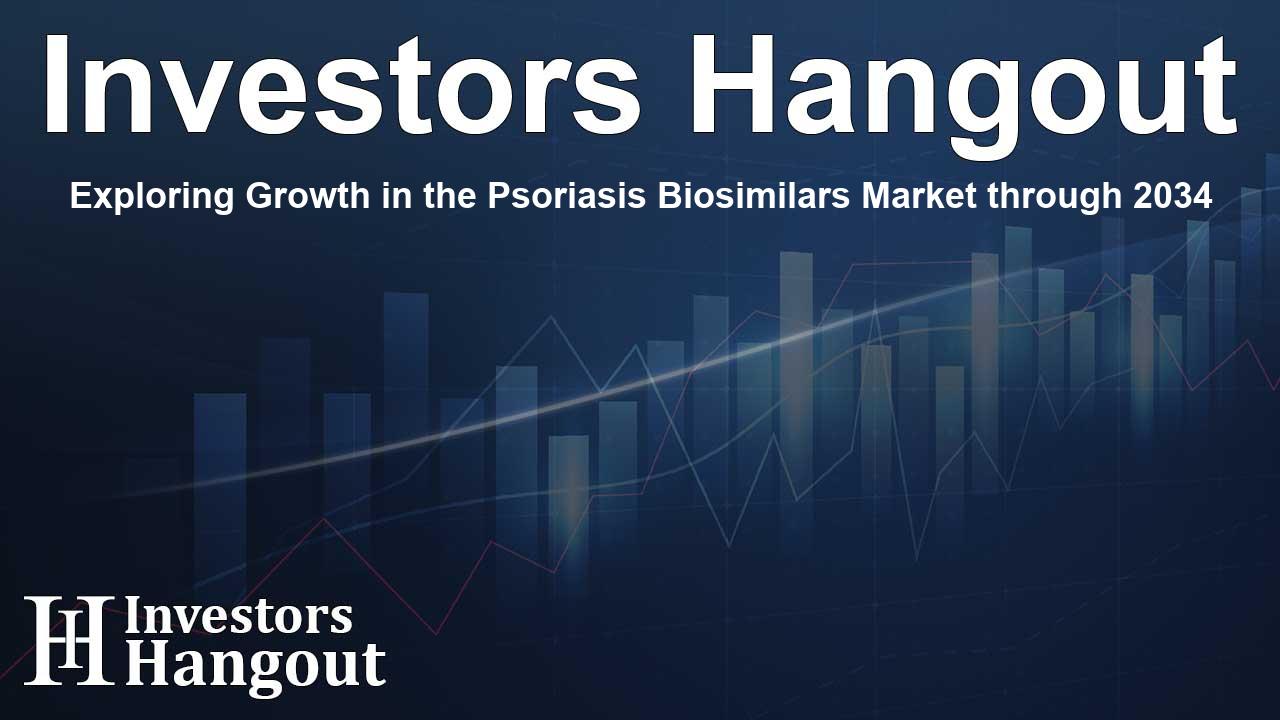Exploring Growth in the Psoriasis Biosimilars Market through 2034

Significant Growth in the Psoriasis Biosimilars Market
The Psoriasis Biosimilars Market is on the brink of substantial growth, with projections indicating a leap from USD 9,228.6 million in the current year to approximately USD 26,679.9 million by 2034. This impressive growth mirrors a robust compound annual growth rate (CAGR) of 11.2%. The driving force behind this trend is the increasing global prevalence of psoriasis, a chronic autoimmune condition affecting millions and highlighting the urgent need for effective and affordable treatment options.
Factors Driving Market Growth
One of the pivotal factors contributing to the expansion of the psoriasis biosimilars market is the cost-effectiveness these treatments provide over traditional biologic therapies. As healthcare costs continue to rise, patients and providers are seeking more affordable alternatives without compromising on efficacy. Biosimilars have emerged as a viable solution, allowing individuals to receive high-quality treatment that alleviates symptoms and enhances the quality of life.
Healthcare Accessibility and Biosimilars
Emerging economies show a mounting interest in biosimilars, spurred by government initiatives aimed at boosting healthcare access. This focus on making treatment options available to larger populations is crucial, especially in regions significantly burdened by psoriasis. The approval of more biosimilars by key regulatory bodies like the FDA and EMA has only further supported market expansion.
Regulatory Framework and Clinical Trials
Clinical trials play a critical role in validating the safety and effectiveness of biosimilars. Ongoing research endeavors are essential to ensure these products meet the stringent regulatory standards set forth by authorities. A series of well-designed clinical trials provides crucial data, affirming that biosimilars can match their reference biologics in terms of structure, function, and clinical outcomes.
Understanding the Landscape of Psoriasis Treatments
The increasing number of biosimilars available for psoriasis treatment stems from significant investments in research and development by leading pharmaceutical companies. This dynamic competition within the market fosters an environment ripe for innovation, driving down costs and enhancing treatment options available to patients.
Market Insights and Future Prospects
As the psoriasis biosimilars market evolves, it’s important to note key segments making an impact. The growth nexus is centered around treatments targeting standard inflammatory pathways, particularly TNF-alpha inhibitors and IL-17 inhibitors, known for their effectiveness in managing severe psoriasis cases. With advancements in biotechnology, the variety of biosimilar products is projected to diversify even further.
Growth Opportunities in Emerging Markets
Emerging markets represent a fertile ground for biosimilars due to their favorable production costs and supportive governmental policies. Regions like Asia-Pacific and Latin America are witnessing a surge in the adoption of these treatments, fueled by initiatives aimed at enhancing healthcare access for patients.
Implications for Patients and Healthcare Systems
The demand for cost-effective treatment solutions aligns perfectly with the growing incidence of psoriasis globally, which affects approximately 2-3% of the population as noted by health organizations. Greater awareness and acceptance of biosimilars by both patients and healthcare professionals are also pivotal in promoting wider usage, ultimately helping to shape the market's future trajectory.
Key Players and Competitive Strategy
The competitive landscape of the psoriasis biosimilars market features prominent players such as Amgen Inc., Pfizer Inc., and Sandoz International GmbH. These companies are instrumental in advancing the field through innovation and strategic partnerships aimed at expanding their market presence, particularly in areas with burgeoning healthcare needs.
Frequently Asked Questions
What is driving the growth of the psoriasis biosimilars market?
The primary driver is the rising global prevalence of psoriasis and the cost-effectiveness of biosimilars compared to traditional biologics.
How do biosimilars impact patient treatment options?
Biosimilars provide patients with affordable treatment alternatives that maintain high therapeutic benefits, improving their overall quality of life.
What role do regulatory approvals play in market expansion?
Regulatory approvals ensure biosimilars meet safety and efficacy standards, facilitating their acceptance and widespread use in markets.
Which companies are leading the psoriasis biosimilars market?
Leading companies include Amgen Inc., Pfizer Inc., Samsung Bioepis, and Sandoz International GmbH, pushing innovation in the market.
What opportunities are available in emerging markets for biosimilars?
Emerging markets enjoy increased government support for healthcare access, reducing production costs which provide opportunities for biosimilars to thrive.
About Investors Hangout
Investors Hangout is a leading online stock forum for financial discussion and learning, offering a wide range of free tools and resources. It draws in traders of all levels, who exchange market knowledge, investigate trading tactics, and keep an eye on industry developments in real time. Featuring financial articles, stock message boards, quotes, charts, company profiles, and live news updates. Through cooperative learning and a wealth of informational resources, it helps users from novices creating their first portfolios to experts honing their techniques. Join Investors Hangout today: https://investorshangout.com/
Disclaimer: The content of this article is solely for general informational purposes only; it does not represent legal, financial, or investment advice. Investors Hangout does not offer financial advice; the author is not a licensed financial advisor. Consult a qualified advisor before making any financial or investment decisions based on this article. The author's interpretation of publicly available data shapes the opinions presented here; as a result, they should not be taken as advice to purchase, sell, or hold any securities mentioned or any other investments. The author does not guarantee the accuracy, completeness, or timeliness of any material, providing it "as is." Information and market conditions may change; past performance is not indicative of future outcomes. If any of the material offered here is inaccurate, please contact us for corrections.